Serious Money and the Art of Austerity, The Browning Version and Rattigan’s Versions, The Apple Tree and But If You Try Sometimes from the Afternoon Play, Richard the Second, Plantagenet, and the Day of the Jackal, Shalom Berlin and a Blind Date with Bloomsday. Radio and Audio Review 19th June 2011
BBC Radio Three has been providing poignant and sharply relevant drama and documentary programmes on the collapse of the domestic and global economy. This is public service broadcasting at its most anxious and perplexing.
As savings and assets evaporate in banking and property collapses, unemployment and inflation soars, and economic confidence implodes most people are helpless and powerless.
We who are not among the fortunate rich, the greedy and selfish elite whose whole objective in life seems to operate a money gambling game that generates wealth out of nothing and involves earning exponential income for the least amount of work, and then loan-sharking against the rest of the world, look to writers, poets, artists and playmakers to provide some kind of solace, explanation and perhaps a little hope.
And so the BBC’s national arts, music and cultural radio channel began the “Money Talks” season (Sunday 12th June) with a new production of Caryl Churchill’s seminal 1980s play “Serious Money” and what I would describe as a contender for documentary of the year: “Europe: The Art of Austerity” in which Michael Goldfarb looked:
“back to the Europe of the 1930s and asked how artists, writers and film-makers responded to the poverty, mass unemployment and political instability of the Great Depression.
Through the work of Bertolt Brecht, George Orwell, Jean Renoir and others, Michael charted the devastating impact of the slump as economic crisis impoverished the continent, engulfing both highly-industrialised nations such as Germany and the more agrarian economies of Greece, Spain and Ireland.”
This programme was of the highest journalistic quality and through cultural analysis caught the Zeitgeist this week as Greece, being the first acute economic faultline, threatens to bring down the European Union’s fragile skittles of financial currency and political integration.
The documentary confirmed, certainly in my opinion, that a new age and art of austerity is emerging. Contemporary novelists Anne Enright and Justin Cartwright are emotionally, philosophically and aesthetically humming, wailing and beating out a response to the corruscating waves of banking crises, spending cuts and popular protests bubbling up around us.
Great credit is due to the programme’s producer Julia Johnson and intelligent presenter Michael Goldfarb for crafting an enquiry that cuts through the ideological confusion, 24/7 journo-babble and superficiality of economic and business correspondents.
Whilst I am an admirer of BBC financial journalism, I do sometimes fear that the system of reporting, rather than their individual efforts, does not capture the historical context and human reality.
Programmes like “Europe: The Art of Austerity” remind us why serious documentaries are vital and provide a frame that everyday journalism is incapable of providing.
Caryl Churchill’s “Serious Money” stage play was very much a creature of the post Big Bang decade of the 1980s. It is ideologically post-Marxist and in the fascinating preliminary interview between Peter Day and the director of the play’s first production at the Royal Court, Max Stafford-Clark, it emerged that the drama was most appreciated by the very target of its satire.
The stalls of the Sloane Square theatre were filled with the white knights, corporate raiders, ambitious young traders, living the high life. It seems that far from engendering pangs of conscience or doubt, the “Yuppies” drank in the depiction of feverish, amoral addictive speculation. The Radio Three play sonically evoked the swaggering, foul-mouthed stockmarket cacophony of the City.
I could not fault the audio production directed by Emma Harding and a formidable and talented cast. However, I found it very hard to identify, or even sympathise with the characters: Todds, Zackerman, Corman, Condor, Baines, Grimes, Frosby, TK and Ajibali. And the plot is built around a sister investigating the murder of her brother in a ghastly story of insider trading and third world exploitation.
This sense of alienation has nothing to do with the artistry of actors and production, nor indeed of Churchill’s fine writing. She and Stafford Clark immersed themselves in accurate ‘Theatre Workshop’ research. I have just never been able to connect with this world. At the time, after working fourteen to sixteen hour days, I had to navigate the grunting boasts, champagne swilling and cellphone yelling hordes of City brokers to get the last train home from Liverpool Street. They looked and sounded like a tribe of savages.
The impact on me of their greed and monetarist fervour was the destruction and liquidation of what I still believe were two valuable public service careers. Now a third is about to be devastated by the same madness.
Oddly enough Churchill’s play feels like an ugly reminder to a poor-house inmate that the bread, gruel and water regime of punishment is the creation of political sadism. Hedge fund managers, futures brokers, and their corrupted lackeys in the Westminster Parliament can still laugh. I and millions like me do not see the joke.
The Radio Three “Money Talks” season is an intelligent portfolio of drama and documentary productions. The next Drama on Three is Edward Bulwer-Lytton’s nineteenth century satire about inherited wealth, “Money” to be followed by George Bernard Shaw’s play “Widowers’ Houses” that engages the moral contradictions of business. I rather think J.B.Priestley’s “An Inspector Calls” deserves to be included in this dramatic dialectic. The Radio Three “Essay” has been chronicling the rise of money in human civilisation from cattle wealth to flexible plastic.
“Money” was recorded on location at Knebworth House, Hertfordshire with an original music score especially performed and recorded by the Endellion String Quartet. It is another impressive independent production, this time by Goldhawk Essential, with a separate sound design by David Chilton. It marks the directorial debut in radio drama for Samuel West and Amber Barnfather takes the credit as the producer. The sound of the production seems richer and more filmic than the usual studio based radio play. (BBC Radio 3, Sunday 19th June 2011)
Sir Terence Rattigan has certainly been getting the respect of BBC Radio in a magnificent audio celebration of his life and plays. Martin Jarvis directed a faithful production of the original stage script of “The Browning Version”, (BBC R4 Saturday 12th June 2011) that for most people is recalled through the screenplay versions that give much more dramatised back story and follow-through to the theatre version that captivated the West End in 1948.
I had one of the most enjoyable listening experiences hearing Martin Jarvis working with his wife Rosalind Ayres at the height of their powers as a director/producer team.
It started filmically with the listener having the sensation of binaurally walking through the English public school on the last day of the summer term, across the playing fields as if you were the boy Taplow on his way for extra teaching from the central character Crocker-Harris- whose dour psychological presence and intimidating character had earned him the not particularly sympathetic nickname “The Crock” or even worse “The Himmler of the Lower Fifth.”
And then Martin quite rightly concentrated the script and direction into what is in fact a one-act play taking place in one room. The intensity of truly great performances by Michael York as “The Crock”, Joanne Whalley as his frustrated and furious wife, Millie, Matthew Wolf as Taplow, Ioan Gruffudd as Hunter, Ian Ogilvy as the Headmaster, Stuart Bunce as Peter Gilbert and Kate Maberly as Mrs Gilbert quite simply took my breath away.
I have rarely heard radio drama so well representing a stage classic. There is a reason that I, like many Rattigan fans, identify so well with this play. I belong to the eccentric shabby middle going on lower middle classes, and went to a grammar school aspiring to be a public school over 40 years ago. And yes, I knew of a teacher with a desiccated and apparently sadistic pedagogical persona who specialised in the classics, but who behind this facade was so compassionate and socially well-meaning.
But while most critics centre on the release of Andrew Crocker-Harris’s “dammed-up misery, disappointment and humiliation” and the volcano of repressed emotion in his misanthropic marriage with Millie, I see this play as a testament to social justice for the battered middle classes.
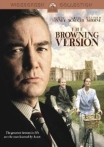
The 1994 film version of "The Browning Version" directed by Mike Figgis with Albert Finney playing Crocker-Harris
The bastard Headmaster, pointedly deprived by Rattigan of any real name, is kicking Crocker-Harris onto the scrapheap because of his heart disease and denying him a pension despite decades of loyal service and hard work. It was the “Crock” who did all the complicated timetables- probably the most boring and unpopular of any job in an educational institution.
It had been Crocker-Harris who had painfully flown the flag of classical tradition so smugly and snobbishly claimed by the public school system over its state inferiors.
This play is all about emotional and economic injustice. Crocker-Harris retrieves his dignity by demanding his right to speak first on prize-giving day as the senior master leaving the school, and Rattigan liberates him from his failed marriage and any delusions of false-consciousness. By expelling his wife from his new life, he will be less lonely. The tears he shed over Taplow’s generous gift of an old Browning edition of the Agememnon can still be relished despite his wife’s venomous diatribe that his pupils mock and condemn him behind his back.
Martin Jarvis extends our understanding of the context of the play with a delightful postperformance talk about its genesis and theatrical history. His mimicking of John Gielgud is one of the best I’ve heard. It is a lovely story of how Terry wrote “Crock” for Johnny only for the coy Thespian Prince to avoid taking on the part until he was assured of its popularity and elevated status.
The Saturday Play 18th June 2011 presents Rattigan’s last play “In Praise of Love” directed masterfully by Celia de Wolff and with quite towering performances from the polymath Martin Jarvis again as Sebastian Cruttwell, Sarah Badel as Lyddia, Kerry Shale as Mark Walters, and James Joyce as Joey. The play was adapted for radio by John Tydeman.
The brilliance of the script is in depicting how true love is sometimes nobler in the lie or withholding of the truth:
“Lydia, the wife, is dying of an incurable disease and only an American friend is told the true facts by both of them. Of course we, the audience, know their secrets too, and therein lie our tears. The critic Harold Hobson called it “the most moving expression of love that I have ever seen on a stage…a compact heart-breaking masterpiece.”
Somebody at Radio 4 made the excellent decision not to telescope five excellent interviews with directors and actors with expert knowledge and experience of Rattigan into an over-compressed half hour documentary. Instead we have five edited almost 15 minute interviews wittily called “The Rattigan Versions” between Mark Lawson and Princess Jean Galitzine, Sir Donald Harwood, Adrian Brown, Thea Sharrock, and Sir Donald Sinden.
Superbly edited and produced by India Rakusen, this was an enjoyable Masters’ course on Rattigan the writer, lover, friend and source text for a younger generation of dramaturg. Thea Sharrock is a hurricane of talent and delight. She can blow her winds in my direction any time and she sounds so young and wise I feel I can see through to the end of my days enjoying her scaling so many more great directorial heights. Hollywood beckons. With 2007 BBC Radio drama credits for John Mortimer’s “Voyage Around My Father” and Harold Pinter’s “The Homecoming” it would be nice to hear more of her work in the sound medium.
We can certainly look forward to her radio drama direction of her own recent Old Vic Theatre success of Rattigan’s gripping courtroom drama, “Cause Celebre”, starring Anne Marie Duff and Niamh Cusack, which will be the extended Saturday play on Saturday 25th June 2011. This is a delightful transliteration of an original radio play going to stage theatre and then coming back again. It is also rather fun to hear radio drama occupying two hours of Radio Four output in one go.
The Rattigan Versions went out in the following five fifteen minute sequences and it would be useful if the BBC omnibussed them or extended the listen again run:
The Afternoon Play on BBC Radio Four has provided a consistent run of outstanding plays and for two weeks has also been the Radio Play download of the week. This is hardly surprising since they have been enriched with the acting ability of Juliet Stevenson and writing skill of Sarah Daniels.
The Apple Tree (Thursday 9th June 2011) was described as “a Family drama set on a Scottish island.”
I hope Juliet Stevenson does not mind my describing her voice as a blend of orange blossom honey and the best single malt whiskey. It is perhaps more pertinent to recognise that a professional actor of this quality has not gone to Scotland to perform one of the lead roles in a forty five minute radio play for the money. The script by Gerda Stevenson, a Scottish actress, writer and director, was subtle and true in terms of dramatic literature.
Maria, played by Juliet Stevenson, is:
“an Englishwoman who has fallen in love with her husband Iain’s Highland heritage – but there’s a shock in store for them when they take a trip home to his mother’s island croft.
It is Hogmanay. Iain, an artist, and the son of a crofter, has just received news of his mother’s death. He and Maria set off from Edinburgh to attend the funeral. They drive north in blizzard conditions. Eventually they reach Iain’s mother’s house, where brother James, sister-in-law Ishbel, and the church elders are gathered. In the aftermath of this family crisis Maria’s love affair with the island way of life will be severely tested.”
The Producer/director Bruce Young created a convincing sound design. Maria and Iain’s precarious snowbound drive felt as slippery and treacherous as Highland ice and tarmac.
The sound of Scottish Gaelic (pronounced Gallick as opposed to Garlick or Gaylick), sung hauntingly and spoken beautifully, infused the atmosphere with authenticity. Iain MacRae played “Iain” in a brilliantly understated way. Carina MacLeod’s Ishbel was carmudgeon and cantankerous, which I am sure was the writer’s intention.
Juliet gave dignity and triumph to Maria and she stole the moral victory at the end after Iain’s cruel mother had disinherited her son of everything.
The recollected image of Maria walking back to the late Matriarch’s manse-style croft, kicking off her shoes to stand on the living room sofa and lift her husband’s painting of the Apple Tree from the wall brought on a smile for many days. She made off with a picture that never really belonged to a mother incapable of treating her children equitably.
I am getting a more regular feeling now from the BBC that they have got over having to make a big noise about gesturing towards tokenism to minorities. Being an oversaturated middle-class and liberal arts institution if they break out in an expression of equality or the realisation that any persecuted “Other” in our society are just as good as anybody else, there is the usual embarrassing splash of tear-soaked self-consciousness.
And so I was relieved that the theme of Sarah Daniels’ afternoon play “But If You Try Sometimes,” (BBC R4 Monday 13th June 2011) was not branded as the “powerful play about living with disability.”
The fact that the character Chloe has cerebral palsy and is certain she will lose her adored carer Rose was just by the way in a charming and heart-warming story. I can’t imagine any listener failing to fall in love with Rose, played with gusto and fun by Lesley Manville. Rose “has a heart bigger than her mouth” and considering the size of the latter, it has got to be on the gigantic scale.
It might be just an afternoon play but this script has the strokes of one of our leading contemporary playwrights. We are dealing with women who might not have had an education but are quick and super-bright. Rose might confuse the body of European Human Rights with the “Unilever Convention” and Chloe’s degree might have been in day-time television, but they have to navigate the more sophisticated century of socially fluid and gendered identities.
Rose falls for an apparently perfect man but what is the place and nature of true love between these characters? Sally Avens directed a gem of a play. Chloe in external performance was performed brilliantly by Amy Golden who expressed subtleties and emotions in her voice and on her communications boards. Alex Tregear articulated Choe’s interiority as a narrative anchor.
“But If You Try Sometimes” became the Play Download of the week on the same day the Beeb gave another outing in the Friday Play slot (Friday 17th June 2011) for Julia Wollander’s “When The Bough Breaks” inspired by her own experience, about the dilemma she faced over whether to put her badly brain-damaged child up for adoption in order to keep the rest of her family together. This was first broadcast in 2008.
“Richard II – And All Our Dreams Will End in Death” completed the second series of Mike Walker’s Plantagenet series. (BBC R4 Classic Serial 12th and 18th June 2011) Patrick Kennedy’s performance as Richard the Second expressed all of the complexities and originality of a monarch who believed culture, refinement and love benefitted a country more than war.
He was a good cook; something that would have inevitably spelt doom for an English king. Perhaps the Hundred Years’ War and all the other bloody wars with France could have been avoided with an exchange of sauce remedies in the royal kitchens.
Richard’s invention of the handkerchief was charmingly dramatised as bringing an end to Dukes and Earls slipping on court snot.
This was a tour de force of audio drama, and suggests the directing and producing duo of Jeremy Mortimer and Jessica Dromgoole should team up more regularly if this is the result of their collaboration.
The dramatisation of Richard’s teenage courage in meeting the mob of rioting paysans and London sans-culottes headed by Wat Tyler was entertaining and had the ring of truth about it. Tyler was cut down by the Mayor of London more by fear and cock-up than design.
Richard the Second would be deposed and assassinated by his former boyhood friend Henry Bolingbroke. Mike Walker’s story telling covered a time-honoured tension in world history. Peace and progress versus War-mongering and plundering. Both strands of politics produce a kind of profit. The virtue of the play was to make us regret the defeat of Richard and his wretched death through starvation.
There is always a continuing stream of thought-provoking documentaries on BBC Radio Four.
The Day of the Jackal celebrated 40 years of the seminal thriller “The Day of the Jackal”, and this marvellous documentary, made by Neil Rosser for the multiple award-winning indy Ladbroke, had Patrick Humphries exploring just what made the book so riveting for him and so ground-breaking for a whole generation of thriller writers influenced by its author, Frederick Forsyth.
The programme entertained and forensically examined. I hadn’t realised how it had broken so many of the ‘rules’ of thriller writing in that the assassin has no name, the story seamlessly mixes fact and fiction, the tools of the killer’s trade are explored in considerable detail and the outcome of the story is known right from the start of the narrative. The programme became a fascinating history on thriller publishing with the story of how Harold Harris, Forsyth’s editor at Hutchinson and Co, swam against the tide of convention by recognising the potential in a book that went on to sell millions and whose royalties exceeded far beyond the dreams of Forsyth’s original advance of £500. Forsyth got a commission for the Jackal, followed by The Odessa File and The Dogs of War.
“The eponymous Jackal is a mercenary and in the novel he is hired by a real-life terrorist group, Organisation de l’Armee Secrete, whose members were intent on killing the French President Charles De Gaulle. The OAS wanted to retain Algeria as a French colony, and when de Gaulle reneged on his emotional avowal ‘Vive l’Algerie francaise’ ie ‘Long Live French Algeria’, and allow self-determination, he became the target of OAS assassins. Of course, as history proves, those assassins were never successful, though not for want of trying. Forsyth lived through those difficult times for French democracy as a Reuters correspondent in Paris and so it was an obvious choice of setting for his first attempt at thriller writing.”
This half hour documentary had layers of depth with revealing and informative interviews with an editor at Hutchinson, Tony Whittome, Professor of Modern English Literature John Sutherland, OAS expert Clement Steuer, writers Lee Child, Andrew Rosenheim, Sam Bourne and the Jackal’s author himself, Frederick Forsyth.
“Blind Date with Bloomsday” (BBC R4 Sunday 12th & Saturday 18th June 2011) with Peter White was a delightful programme. I felt I was on the best kind of trip to Dublin where the crack (conversation) was flavoursome and the Guinness at the right temperature and thoroughly pallatable. What Mr White:
“realises is that whilst the text of Ulysses might be dense and difficult on the page, it is in fact perfectly suited to the ear, as radio – filled with gleeful linguistic tricks, puns and jokes and stream of consciousness bawdiness.
Having read Ulysses in Braille, Peter finds out that Joyce was long troubled by eye problems, and that the author’s eyesight worsened considerably whilst writing the book when exiled in Zurich. As a blind man himself, Peter is interested to hear how Joyce uses blindness and myopia to great symbolic effect in his work – evoking the whole of Dublin society by emphasising all the senses – sound, touch and smell as much as sight.”
Radio Four said that though “much quoted but arguably little read, James Joyce’s Ulysses is a Modernist classic.” Well I did read the book long ago and being somebody with a sound imagination fully recognised that Joyce was part of a modernist literary movement crafting literature to a sound world where culture was having a dimension of expression in radio. Virginia Woolf demonstrated this in “Mrs Dalloway” and even George Orwell had a sonic diversion in the incongruous hop picking sequence of “A Clergyman’s Daughter.” Joyce set his novel on June 16th 1904 and thus established its own annual feast day. The documentary follows Peter White to Dublin on Bloomsday last year:
“to meet the celebrants who enthusiastically enact sections of the book. Among them – resplendent in boater and blazer – is Irish Senator David Norris, a founder of Dublin’s Joyce Centre, explaining how an apparently random string of consonants precisely captures the sound of a breaking wave. But there’s also the writer and Irish Times journalist John Waters who’s courageous enough to confess that he’s only ever managed to get as far as page 35 of Ulysses. “It’s more important to Irish tourism”, he says, “than to readers”.
Congratulations to producer Mark Smalley and the reporter-presenter Peter White for making “Ulysses” literature to be spoken and enjoyed rather than read and dreaded.
“Shalom Berlin” (BBC R4 Monday 13th June 2011) was another superb documentary reconciling the present with the past. 70 years after the Holocaust and the relentless persecution of Jews and Jewish culture, Berlin is now proving a magnet for young Israelis. Yes, ironic what?
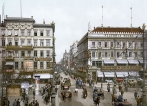
A romantic depiction of early 20th century Berlin from a postcard illustration in the US Library of Congress.
Berlin-based reporter-producer Thomas Franke travelled with youngsters from Tel Aviv to Berlin’s clubs, cafes and theatres where they’re partying like there was no yesterday. The programme investigated an agonising phenomenon for succeeding young generations of Israelis who find they have to decompress after their national military service, most often dealing with the miseries and corruptions of occupation and the growing realisation that they live in a society that is perpetually at war.
In the programme you heard Jewish performer Nir de Volff who “is well established in the German capital and says his grandfather takes delight in his success: “it was almost a sweet revenge for him that his grandchild can live his life proudly and actually produce a weird culture of German Israel in Berlin.”

Contemporary Berlin by Beppo. Now retrieving its Mecca status as a city of culture and thriving art movements.
You also heard young Yasmin from Tel Aviv who talked about the very fact that for her grandparents everything German was loathsome was why she came: “of course everything that is taboo becomes appealing and fascinating. It makes you curious about it. It’s not trying to do something bad and go against what they told you just to try to understand to see for myself if I agree with their opinion.” The programme was enabled and co-produced by Simon Elmes.
The BBC R4 documentary podcast of the week is “The No.219 Sodcast Project” (BBC R4 Tuesday 14th June 2011)
“Young people are reclaiming buses and trains with their tiny mobile phone speakers and gangs. The ‘sodcast’ is everywhere. Inspired by a bus campaign to exterminate the sodcaster, Ian McMillan meets those committed to giving up their music in public and others fighting to the last for their right to peace and quiet.”
If you are happy about listen again I strongly recommend a three hour marathon listen to BBC Radio Four Extra “I Did It My Way” (Saturday 18th June 2011) when Andrew Sachs, The Fawlty Towers actor and writer, chats to Peter Reed about his radio life and times. The “I Did It My Way” frame is crass, but I suspect there was something intentionally postmodernist about it. The content is a tribute to a legend of radio and contains seminal works of audio drama, including “the play without words” Revenge.
The series of “Unnatural Death” is 1970s radio drama nostalgia with another investigation for upper class sleuth Lord Peter Wimsey, played by Ian Carmichael. Similarly “The Memoirs of Sherlock Holmes” is developing with cracking 1990s dramatisations (by Bert Coules) of Sir Arthur Conan Doyle’s famous detective starring Clive Merrison and Michael Williams.
Programmes to make a date with:
Monday 20th June BBC Radio 4 documentary. “When Wesley Went to Winchester”. In 1970, broadcaster Wesley Kerr was awarded a County Bursary to study at the prestigious public school Winchester College. Forty years later, he opens the gates of memory and attends a special reunion to find out what happened to the other bursary boys and explores the scheme’s attempts at ‘social engineering.’
Tuesday 21st June, Afternoon Play, A Terrible Beauty by David Pownall directed by Peter Kavanagh. The poet W.B. Yeats travels to propose to legendary beauty Maud Gonne soon after her husband was executed by the British in the 1916 Easter Rising in Dublin.
Audio version of the review by Tim Crook.



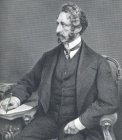
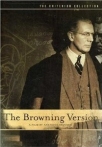



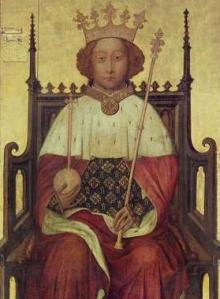




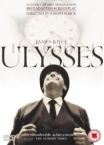
Beautifully written, Tim (although I would expect nothing less!) and thanks for the alert on some productions I might have missed. Am heading for the iPlayer!
Richard Rudin
June 19, 2011 at 3:38 pm